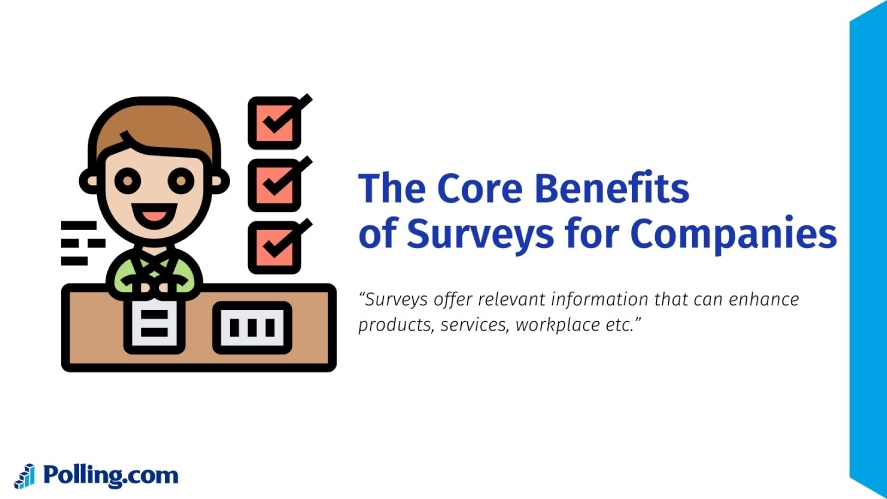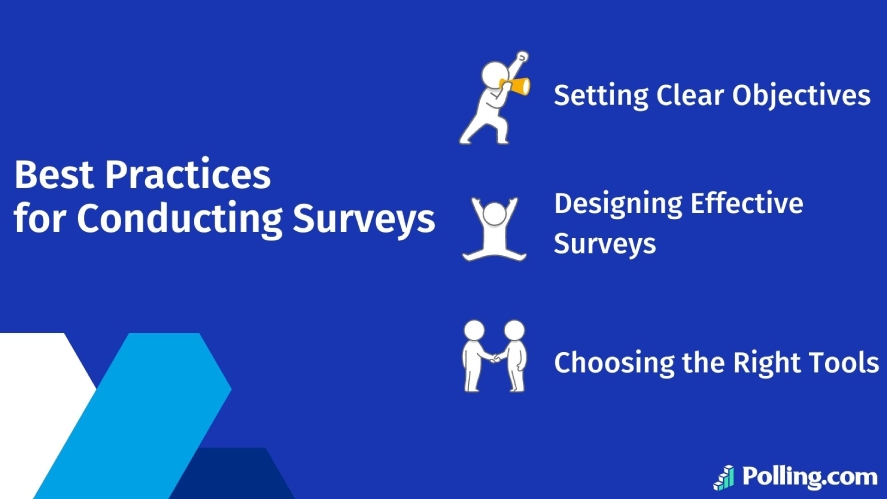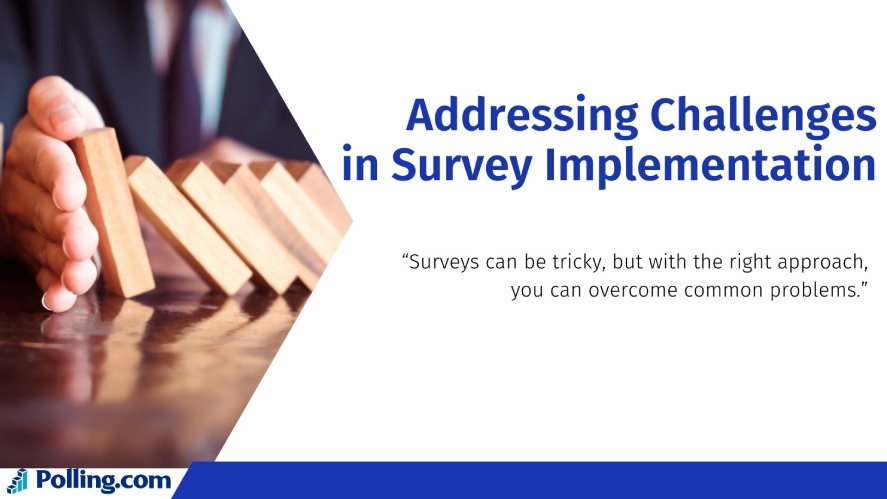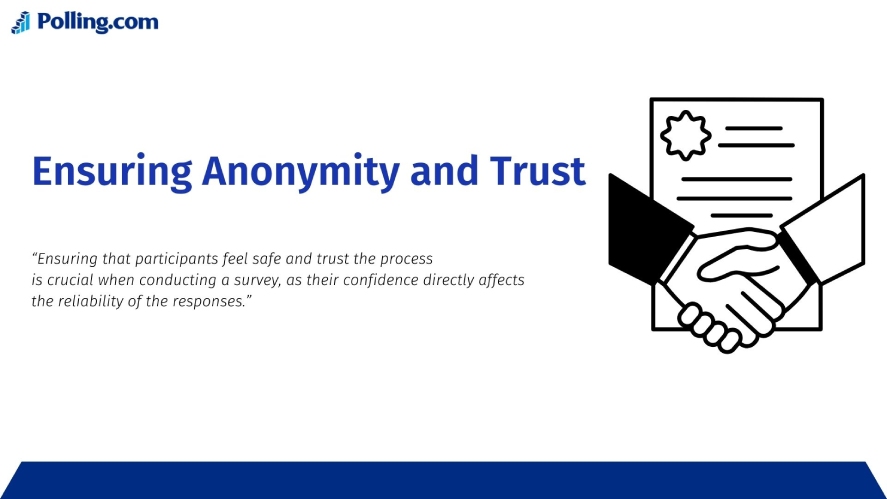
Why Are Surveys Important for Companies? Discover Their Key Benefits
Surveys are a series of questions that target a specific group of people to collect the data.
They play a pivotal role in business operations, as they help business owners make intelligent decisions with insightful data.
In today’s dynamic markets, many companies have used different types of surveys to remain competitive and stand out from the rest.
This article will cover the core benefits and long term value of surveys to answer why are surveys important for companies, as well as go through some common survey types companies should use and other challenges they should be aware of.
The Core Benefits of Surveys for Companies
Surveys have both immediate and long-term benefits for companies. But first, let’s discover the three core survey benefits!

Better Understanding of Customer Needs and Preferences
Surveys help companies uncover customer expectations and preferences.
Understanding your customers is crucial, as they are the key to a business’s success.
By asking customers about their experiences when using a product, you know which feature they like and their pain points.
The data collected from the survey is then analyzed and evaluated for further product innovations and improved services, enhancing service experiences for customers.
This creates a win-win situation where businesses constantly grow and upgrade their products while customers enjoy better solutions tailored to their needs and expectations.
Enhanced Employee Engagement and Retention
Surveys not only target the customers, but they also measure employee satisfaction and retention.
By gathering honest feedback, companies can identify areas for improvement, such as work-life balance, career development opportunities, or management practices.
Once employee voices are valued, they feel that they are part of the team, and they are more likely to be motivated, satisfied, and committed to the work.
As a result, employee satisfaction surveys are a valuable tool for improving workplace policies and culture and reducing turnover rates.
Data-Driven Decision Making
Survey data provides businesses with insights for strategic decisions, such as launching new products, entering new markets, or optimizing operations.
Instead of blindly making a decision, companies can reduce risks and tailor their strategies for maximum impact.
For example, surveys might reveal a growing interest in eco-friendly products, forcing a company to develop sustainable approaches.
Similarly, operational feedback can highlight inefficiencies, enabling businesses to streamline processes and improve overall performance.
Most survey tools, like Polling.com, provide ready-to-analyze data, making it easy to choose the right direction quickly.
Why Are Surveys Important for Companies: The Long-Term Value of Surveys
Besides immediate benefits, surveys also benefit businesses in the long run by building brand loyalty, spotting emerging trends, and measuring the impact of strategic changes.
Building Brand Loyalty Through Customer Insights
Acting on survey results proves to customers that their opinions matter. It also shows the companies’ commitment to developing the best products for their customers.
Therefore, surveys help businesses foster trust and loyalty.
Once the company has built enough reputation, it receives more returned customers and positive word-of-mouth.
Over time, this approach strengthens relationships and creates a strong customer base.
Spotting Emerging Trends with Market Research Surveys
Using surveys, companies can identify and predict market trends to adapt new strategies proactively.
By using a simple survey with tailored questions, businesses can spot growing interest in a new product or technology to seize new opportunities.
For instance, survey data might reveal a rise in remote work preferences, prompting businesses to develop flexible solutions.
So, staying attuned to these trends helps ensure long-term relevance in a dynamic market.
Measuring the Impact of Strategic Changes
Besides building brand loyalty and spotting new trends, surveys are also a powerful tool to measure the impact of strategic decisions.
With the data before and after conducting the survey, companies can quickly evaluate the impact on customer satisfaction, employee engagement, or operational efficiency.
This approach explicitly points out the areas for improvement and provides actionable insights to help businesses make more informed decisions moving forward.
Types of Surveys Companies Should Use
There are multiple survey and polling methodologies that can help companies achieve their goals. In this section, we’ll focus on the three most important survey categories.
1. Customer-Focused Surveys
Customer-focused surveys are surveys that primarily target your customers to understand their needs, preferences, and experiences.
Among them, customer satisfaction surveys or Net Promoter Score (NPS) surveys are the perfect survey types for measuring how well a business meets customer expectations.
They consist of multiple questions, like “On a scale of 0 to 10, how likely are you to recommend our business to a friend?”, to understand how customers feel about a service or product.
Similarly, post-purchase feedback surveys tend to focus on gathering insights from customers after a purchase, helping businesses identify strengths, address weaknesses, and enhance the overall customer experience.
2. Employee-Centric Surveys
Companies can use different kinds of surveys to learn more about their employees. One of these types is employee-centric surveys.
These surveys assist companies in understanding how workers feel about their jobs.

For instance, employee engagement surveys check if employees are happy and interested in their work.
With job satisfaction surveys, companies can ask if workers like their tasks and feel comfortable at work. About 360-degree feedback surveys, workers can give feedback to each other and their bosses.
Through using these surveys, companies can make the workplace better for everyone.
3. Industry-Specific Market Research Surveys
Last but not least, companies can use industry-specific survey research to learn about their business.
These market research surveys focus on areas like B2B (business-to-business) or local markets.
For example, a company that sells farming tools can ask farmers what tools they need.
A small shop can ask people in the town what products they want. This way, companies can make better products and services for their customers.
Best Practices for Conducting Surveys
Using surveys is helpful because they provide a wealth of information, but they must be well coordinated.
In this section, we will discuss the most helpful tips for making your surveys free from misunderstandings and serve the right purpose.

Setting Clear Objectives
Before you write survey questions, you need to ask yourself: What is the purpose of a survey?
A clear purpose helps you ask the right questions, ensuring you get useful answers.
If you want to know what snacks people like, you can focus on snack questions. But if you don’t know the purpose, you might ask random things that don’t help, like drinks.
Clear objectives will keep your survey simple and helpful.
Designing Effective Surveys
A successful survey begins with carefully crafting questions that are easy to understand, ensuring they are clear and straightforward for all participants.
The questions should not be too long or confusing. They must be clear, easy to understand, and allow respondents to answer without feeling overwhelmed or uncertain.
They should also be fair and not try to make people answer in a certain way (survey bias).
A good survey question makes people want to answer honestly.
Also, it is helpful to use easy words and keep the survey short so that people do not get bored.
As a result, they will give good information that can be used to learn more about what people think or feel.
Choosing the Right Tools
When creating surveys, Polling.com stands out as a fantastic option.
Polling.com lets you design your survey the way you want with many options to customize it.
You can change the customizations like change the colors, questions, and layout to fit your needs.
It also gives you useful data through analytics so you can see how people answered and understand their choices better.
In addition, one of the best features is real-time reporting.
As soon as someone takes the survey, you can see the results right away. This makes it easier to know what people think quickly.
So, Polling.com is simple to use and very helpful for making good surveys.
Addressing Challenges in Survey Implementation
Surveys can be tricky, but with the right approach, you can overcome common problems.
Let’s look at how to keep people interested in your survey, make sure the data is correct, and protect people’s privacy.

Survey Fatigue: How to Keep Response Rates High
Survey fatigue happens when people get tired of answering too many questions.
Your client can stop filling out surveys or give quick answers without thinking. So, to keep response rates high, it’s important to make surveys short and simple.
You should use easy words and keep the questions interesting.
Additionally, adding fun pictures or rewards can also help.
Furthermore, sending reminders in a friendly way can encourage them, too.
Overall, making surveys fun and quick is the best way to keep people interested.
Overcoming Data Misinterpretation
When conducting surveys, one common obstacle that can arise in almost all businesses is the potential for misinterpretation of the data, which can lead to wrong conclusions.
To resolve this error, it is important to use tools like graphs and charts.
Presenting the data in a simple and clear way can make it easier to understand, allowing people to quickly find the critical information.
Another strategy is to check the data carefully and ask someone else to review it to find mistakes.
Explaining the data in simple words is also helpful so everyone knows what it means.
Ensuring Anonymity and Trust
Ensuring that participants feel safe and trust the process is crucial when conducting a survey, as their confidence directly affects the reliability of the responses.
One way to do this is by keeping their answers private, such as not sharing their names or personal details.

When people know their answers are secret, they are more honest.
Additionally, you should tell them why the survey is being done and how their answers will help. As a result, your respondents will feel respected and good about helping.
Being fair and kind in surveys is part of doing the right thing, which is called being ethical.
The Role of Technology in Modern Surveys
Technology has changed the way we do surveys today. With new tools and apps, it’s easier and faster to collect and understand the answers.
AI and Machine Learning in Survey Analysis
Nowadays, with the advancements in technology, survey data calculations have become more efficient and effective, allowing for quicker and more accurate results.
Special tools like AI and machine learning can look at many answers quickly and data survey analysis as accurately as possible.
As an example, Polling.com uses AI to check what people say in surveys and guess what might happen next.
AI can find patterns that humans might miss by analyzing data quickly and spotting trends or connections that are not obvious.
With technology, survey tools for business are more helpful than the normal way.
Mobile-Friendly and Multi-Channel Surveys
Surveys are now easier to take because people can answer them on their phones, computers, or tablets.
You can send surveys through apps, emails, and social media so more people can join, and it is simpler for everyone to share their opinions.

When people can fill out surveys anytime and anywhere, they are more likely to do it.
You will get better and more helpful answers to improve products and services.
Real-Time Data and Analytics Dashboards
With real-time data and analytics dashboards, you can see results right away. It means you don’t have to wait a long time to know what others think.
These technologies will help you get immediate insights for decision-making.
So, if something isn’t working, you can fix it fast.
Real-time data is like getting answers to questions as soon as you ask them.
Frequently Asked Questions About Surveys
Once you begin the survey process, you may encounter some challenges and questions, and this section will answer some common questions about surveys to help you understand them better.
Why Are Surveys Important For Companies?
Surveys are essential because they help with three main things.
Firstly, surveys collect data, which gives you the necessary information about your products and services.
Secondly, surveys help you understand your customers better, like knowing what customers’ opinions are.
Thirdly, surveys assist in making good decisions since they allow you to hear from the customers themselves.
How Often Should Companies Conduct Surveys?
When planning to conduct a survey, take some time to think about your goals and what you want to achieve from the process.
Remember that the way you make and ask questions should match your goals.
If you want to encourage employee participation, you could conduct a quarterly survey data collection to find out how happy they are and learn what they need.
Similarly, if you want to know what customers think after a big survey campaign, you can conduct a follow-up survey after it has been completed.
What Are The Common Challenges With Surveys?
Surveys are useful for gaining insight into what people think, but they can sometimes come with challenges.
One problem is survey fatigue. This happens when people get tired of answering too many questions.

Another problem is low response rates, which means not many people answer the survey. If not enough people answer, the survey may not show what everyone really thinks.
Biased questions are also a problem.
These are questions that make people choose a certain answer, even if they feel differently.
How Can Polling.com Help Improve Survey Effectiveness?
Designing good surveys can take time and effort, but Polling.com makes it easier with its simple and intuitive platform.
It has simple buttons and clear steps, so anyone can make a survey quickly.
You can change the themes, add your questions, and make the survey look how you want.
Polling.com also shows you results in charts and graphs, so you can understand what people think right away.
What’s The Difference Between NPS and Customer Satisfaction Surveys?
NPS (Net Promoter Score) and customer satisfaction surveys help businesses know what customers think about a product, but they are different.
An NPS survey could ask users how likely they are to recommend a new app to their friends or family. They answer by giving a number from 0 to 10.
Meanwhile, a customer satisfaction survey asks more questions about things like the quality of the product, the price, and the service. After that, businesses can understand what they can make better.
So, NPS surveys help you gather a general sense of customer liking or disliking, while customer satisfaction surveys focus more on gathering feedback about specific aspects of the customer experience.
Empower Your Company with Surveys
In conclusion, surveys are crucial for helping your company succeed.
With surveys, you can get helpful ideas that help make better decisions. But it’s not just about getting any answers – you need answers that you can use to make changes.
That’s why it’s important to use a good survey platform.
Using the right tool helps you create surveys that give you reliable and useful insights. So, start using Polling.com today and see how it can help your company grow!
